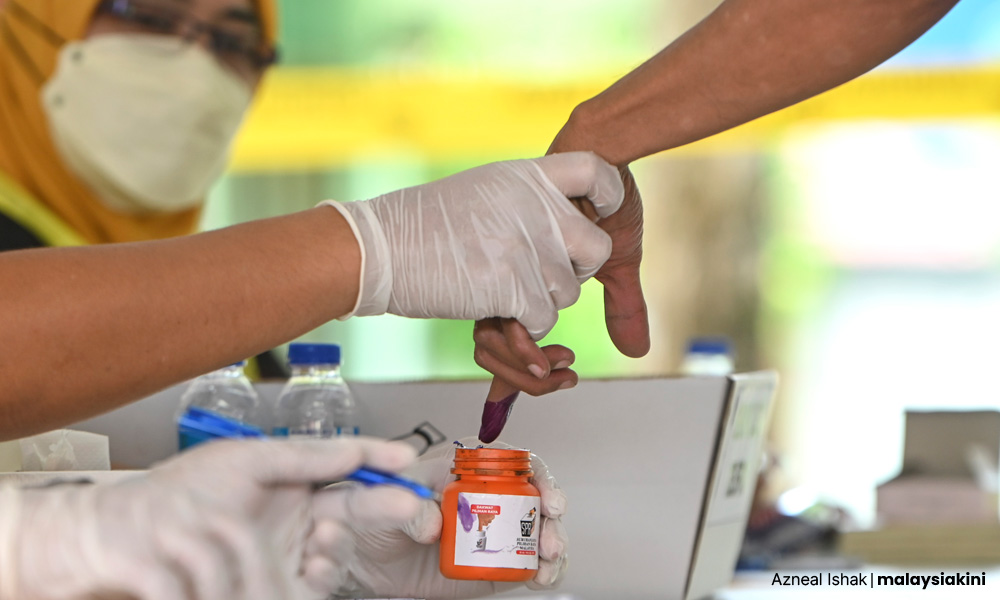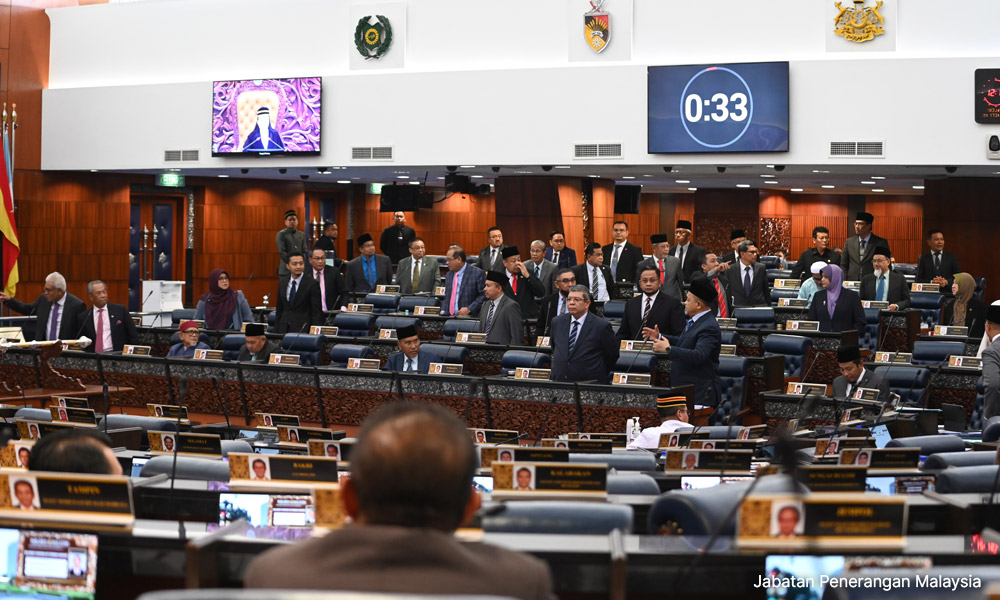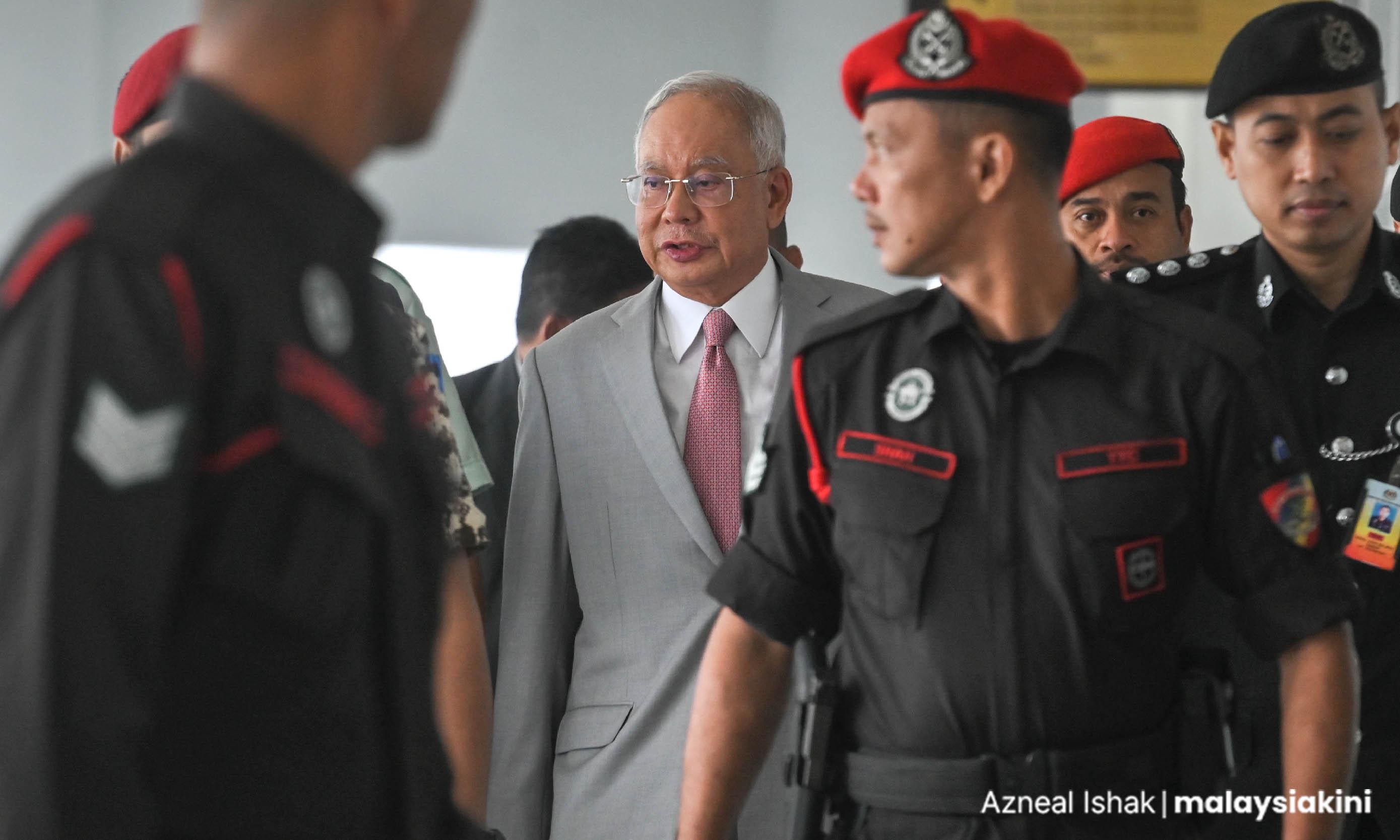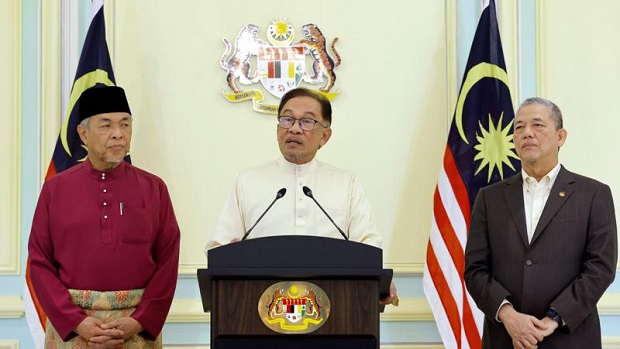BOMBSHELL – BIG STEPS ANWAR NEEDS TO ‘GUT UP’ TO DO – NOW ITSELF! IF HE WANTS TO STOP THE INCESSANT & DESTABILISING ‘CONSPIRACIES’ CRAZE – PASS A FIXED-TERM PARLIAMENT ACT TO FIX GE16 IN FEB 2028 – MAKE VOTING EASIER FOR THE PEOPLE BY ALLOWING ADVANCED DISTANT-VOTING AT KEY CENTRES IN STATE CAPITALS & CITIES – SO AS TO REDUCE FINANCIAL BURDEN & TIME WASTING TRAFFIC JAMS THAT VOTERS NOW HAVE TO BEAR JUST TO ‘BALIK KAMPUNG’ TO VOTE – STARTING NOW, WITH THE UPCOMING 6 STATE ELECTIONS!
Three ways Anwar can prevent Sheraton Move 2.0
In my column last Saturday, I argue that Sheraton 2.0 would not happen before the state elections because Perikatan Nasional would not want to waste their bullets in orchestrating by-elections before that.
However, if Umno is wiped out in Penang and Selangor in the state elections, then the panic caused by its existential threat may make one story plot of Sheraton Move 2.0 possible.
Umno leaders and grassroots may demand the government to outdo PN in being Muslim nationalist, and PN would gladly take the battlefield further to the right.
PKR and DAP would have to fight back, the government would be seen as divided and chaotic, the markets would lose confidence, middle-ground voters would give up on politics, and PN can orchestrate and win the ensuing by-elections.
Here are three moves that Anwar can take to prevent – or more accurately, reduce the risk of – a Sheraton Move 2.0 plot.
First, raise the turnout in the state elections by making voting easy for voters. Second, set the dates of parliamentary dissolution on Dec 18, 2027, and the 16th general election (GE16) in February 2028 by passing a Fixed-Term Parliament Act. Third, mobilise the nation and involve the opposition to prepare for the upcoming economic and environmental crises.
Move 1: Make voting easy to raise turnout
To avoid a wipeout of Umno in Penang and Selangor, the solution is not to hand over seats currently held by PKR or Amanah to Umno. If Umno’s obsession with freeing former prime minister Najib Abdul Razak – who is serving 12 years in jail for corruption – cannot excite its base, the Pakatan Harapan base is more likely to be turned off and stay at home, handing its seats to PN by narrow margins.
The key to a better chance for Harapan-BN candidates is to raise the turnout. If Harapan and BN voters are willing to come out to vote, they are more likely to vote Harapan-BN than PN.
Although PN recognises that they need to go beyond the Malay-Muslim nationalist constituencies, their leaders’ actions and speeches have pushed more liberal and minority voters away, now more than ever in GE15.
However, as compared to PN voters who tend to follow party leaders’ instructions, Harapan and BN voters are more likely to stay at home or not come home to vote if they are away.
Across countries, sub-national elections yield lower turnouts than national elections when they are held at different times because the stakes in the former are smaller.
In the worst case, Johor – which registered an impressive 74.5 percent turnout in GE15 – recorded a turnout of 54.55 percent during its state election eight months earlier, a reduction of 20 percentage points.
Anwar can turn this around with two moves.
First, announce the election date now so that voters are psychologically conscious and prepared when to vote. Second, allow out-of-state voters to vote in distance-voting centres so that they don’t have to travel home to support Harapan-BN.

An early announcement is possible if the states dictate that they will go full term (except Penang, whose auto-dissolution is late on Aug 4) or seek royal/gubernatorial assent now for early dissolution at their preferred date.
The Election Commission (EC) – if necessary, with the prime minister’s instruction – can then announce the election dates.
If Prime Minister Anwar Ibrahim wants a longer runway and keeps polling on a Saturday, then the last day possible is Aug 19. For the states’ dissolution dates and early announcement of election dates, see Bersih’s policy brief.
To further make voting easier, the EC should set up distant polling centres in state capitals and major cities in Sabah and Sarawak, so that voters can cast their ballots a week ahead of polling day and have their votes counted at these centres after polling is over nationwide.
This would benefit not just voters who save time and money, and avoid the risk of traffic accidents. It also benefits political parties which can get more votes without illegally paying “travel money” and even businesses for reducing leaves taken by workers for the election and disruptions.
Advanced distance voting is safer than postal voting. It is possible if the polling date can be announced now for voters to know their unavailability and register ahead. All Anwar needs to do is to tell the EC to do it, who naturally does not want extra work unless told.
Move 2: Fix GE16 in 2028
The spectre of Sheraton Move 2.0 remains alive in people’s minds, partly because our election dates are not fixed, hence the opposition can always think about forcing a fresh election even if party-hopping is now remedied with by-elections.
The simple solution is to plant this idea that GE16 would take place only in February 2028. A government change is legitimate after that.
This can be done by passing a Fixed-Term Parliament Act (FTPA) with only a simple majority, without testing the government’s two-thirds majority.
By not taking the path of a constitutional amendment, the act would only bind the 15th Parliament.

What is this FTPA about? It would say, simply, that Parliament will serve its full term to its last day on Dec 18, 2027, and the prime minister cannot seek early election except in two circumstances:
(a) The government loses its majority in the House.
(b) For whatever reason, two-thirds of parliamentarians pass a resolution calling for an early dissolution.
It can further prescribe that GE16 shall happen in February. If Parliament is dissolved after the midnight of Dec 18, 2027, GE16 must constitutionally take place within 60 days, the latest by Feb 18, 2028. It just basically says GE16 cannot happen in January.
This act seemingly changes nothing. First, it does not affect the king’s power to withhold his assent to a request for early dissolution. Second, if the opposition can defeat the government in a confidence or budget vote, a fresh election can still take place.
So, how can this be a magic wand? Simple. Malaysians now know GE16 will happen in February 2028 if no disruption happens. With the dissolution and election dates ascertained, it is now a choice before Malaysians and not just politicians: do we want a disruption to this calendar?
From ordinary voters and businesses to civil servants, Malaysians who want political stability and an exact electoral calendar will then have a concrete political goal to unite them: GE16 only in February 2028, not earlier. The opposition may now face greater pushback if they attempt to disrupt this.
It is then not about saving Anwar’s or Harapan-BN ministers’ jobs. It’s about making Malaysians’ lives easy.
Move 3: Rally Malaysians including opposition with imminent crises
The best defence is a good offence. To prevent political crises mounted by the opposition, Anwar should turn the table around to rally all Malaysians with imminent crises: from the global recession and economic disruption caused by Industrial Revolution 4.0 and artificial intelligence to environmental crises.
We are now hit by heatstroke after unexpected floods since the end of 2021. A Kelantanese boy has died. While the government is contemplating extending school holidays as a mitigation measure, we have not seen the same degree of attention paid to this as to the Sheraton Move 2.0 or Najib’s pardon.

National crises can deny the opposition excuses for a power grab or political sabotage. That’s why countries formed “national unity governments” to face external threats like wars (UK and Canada in WW2), economic crises (Italy in 2013), pandemics (Ireland, Italy, and Israel amidst Covid-19), and natural disasters (Nepal during the 2015 earthquake).
When the opposition is included in decision-making, whether officially as ministers or just being consulted on key decisions, they share the credit for success in policies and responsibilities for failure. That takes away the incentives to nitpick government policies to score political mileage.
Anwar has done the right thing to involve PN state governments in the federal government’s unprecedented state-level Hari Raya celebrations. The opposition may question its motives but – on the surface – this shows the Anwar government’s willingness to co-exist with the opposition.
Anwar should go beyond such superficial gestures and invite the federal opposition and all state governments to deal with national crises, beginning with the heatwave and water supply.
Anwar needs to rally Malaysians – and in the process, force the opposition to join – to find and implement solutions. The “whole of government” and “whole of society” approaches often leave out the opposition.
Contrary to the old-Umno thinking, giving the opposition a constructive role will not disadvantage the government because the opposition cannot quickly build up policy expertise to “own” these issues.
Yes, these are ways that Anwar can fend off Sheraton Move 2.0 instead of pandering to Umno’s pressure to let Najib and Deputy Prime Minister Ahmad Zahid Hamidi walk free, which may only lower turnout in the state elections and any by-elections that follow. WRITER – WONG CHIN HUAT – MKINI
MKINI
.
